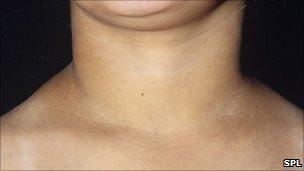100,000 older people missing thyroid treatment - study
- Published

Hypothyroidism is caused by an underactive thyroid gland
Around 100,000 older people in the UK are missing out on thyroid medicine that could improve their lives, according to a study.
The Journal of Medical Screening, external study examined women over 50 and men over 65 - and found 8% had underactive thyroids.
But many were not getting treatment for symptoms, including lethargy and weight gain.
Researchers, at the Wolfson Institute, said screening would improve lives.
Underactive thyroid results in a condition called hypothyroidism, which can result in symptoms including depression and forgetfulness as well as tiredness and weight gain.
These symptoms are often mistaken for general signs of ageing - and the disease can therefore be either misdiagnosed or undiagnosed for some years.
The authors of the study believe that women over 50 and men over 65 should be screened for hypothyroidism. They say that if this were done, 100,000 people could benefit from a thyroid treatment called thyroxine.
Professor Sir Nicholas Wald, Director of the Wolfson Institute said screening would result in a better quality of life:
"It is rare to be able to find chronic diseases in adults that can be identified by screening, but this research shows that screening for adults for hypothyroidism would be worthwhile."
Trial
The study initially assessed 4,365 people, women were over 50 and men were over 65.
They found that 8% of people in this group had underactive thyroids - 341 people in total.
Of this group, they selected 56 people to take part in a eight month trial, during which they were given thyroxine, a treatment for underactive thyroid.
The results showed that those with the more serious thyroid problems - around a quarter of people with underactive thyroids - benefited from thyroxine treatment.
The researchers say that if their results were reflected across the general population, it suggests that 100,000 people are missing on treatment.